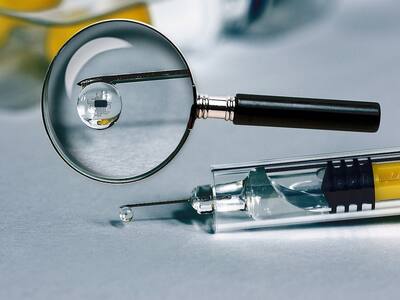Don’t Miss Out on the Latest Updates.
Subscribe to Our Newsletter Today!
COVID-19 Vaccines: Counterfeiting Issue And Authentication Measures

According to Pharmaceutical Security Institute, incidents of theft and counterfeiting of pharmaceutical products rose nearly 69 per cent globally over the past five years. Let's talk about some factors that are making the circulation of falsified COVID-19 vaccines easier in India.
From the onslaught of the pandemic in 2019-2020 and the rollout of Coronavirus vaccines, incidents of falsified vaccines started surfacing not just in India but across the globe. In a raid conducted on February 2, the Uttar Pradesh Food and Drug Administration (FDA) and officials of Special Task Force (STF), Uttar Pradesh Police seized a large tranche of spurious COVID-19 vaccine, Remdesivir injection, rapid antigen test kit, medicines, empty vials, swab sticks etc. The estimated market value of seized material is around four crores.
The demand for coronavirus vaccines has only increased as the vaccination drive picked up in the country progressed from frontline workers, elderly citizens to general people and now children. Vaccines have been developed to safeguard the public from the deadly virus. But the undercurrent of circulation of fake and spurious vaccines and medicines is undermining the healthcare system's efforts in protecting people. It also erodes public trust and increases hesitancy in vaccination.
Counterfeiters do not make vaccines. They put useless or harmful substances in duplicate packaging. The boldness with which they are hijacking and overriding is the result of the loopholes and weaknesses of the supply chain. In the recent raid cited above, the accused a group of five individuals in Varanasi allegedly filled empty vials with distilled water and passed them off as vaccines. To make COVID-19 rapid antigen test, the accused used pregnancy strips which look like pregnancy kits as both are strip-based tests. They procure pregnancy kits from the market and paste a wrapper of the antigen kit.
Also Read
As per estimates, incidents of theft and counterfeiting of pharmaceutical products rose nearly 69 per cent globally over the past five years (according to Pharmaceutical Security Institute). Also, Interpol recently issued a global alert across 194 member countries forewarning them against organised crime networks possibly targeting coronavirus vaccines.
What is making the circulation of falsified COVID vaccines easier?
- Lack secure supply chain - Globalisation of the pharma industry has created supply chain issues. For example, if the active ingredients come from China for product manufacturing in India packaged in another country and shipped through another country to USA and Africa. In the absence of a whole track and trace system in the supply chain, it becomes problematic to establish the authenticity and traceability of vaccines.
- Lack of effective anti-counterfeiting solutions with a lack of stringent enforcement and penalisation.
Lack of awareness and training of nursing staff, hospital staff and pharmacists about the anti-counterfeiting solutions and identification process. Without their active participation in checking the authenticity of vaccines, the whole system is almost ineffective.
There is a solution
Making QR Codes mandatory on Active Pharmaceutical Ingredients (APIs) is a significant step in the right direction. This step will help distinguish spurious and original medicines and make the ecosystem vulnerable to substandard and falsified products. However, it would be advisable to adopt a robust, comprehensive approach. The ideal solution must include physical and digital features providing authentication and increased digital security to reduce system vulnerability. The approach adopted by European Union, falsified medicine directives, is a good example. It introduced two new safety features that must be present on each pack or bottle of medicine: a unique identifier (a 2D barcode containing a unique 20-digit pack number and other data) and a physical anti-tampering device (ATD). India should implement these measures on formulated drugs as well.
Spotting fake vaccines
Our nursing staff, pharmacists, and medical professionals handle vaccines daily. Their expert eyes can detect falsified coronavirus vaccines. They need to be empowered with training and awareness to be more vigilant in spotting fake vaccines.
Inconsistencies and expiry date: Closely check the vial seal and expiry date. Any discrepancies are a cause of concern.
Packaging COVID vaccines come in tamper-proof and protective packaging for safe transit through the supply chain. Make sure the packaging is proper, and all the labels are intact.
Participate in authentication Check the anti-counterfeiting measures, e.g. security hologram, void pattern, QR Code or barcodes etc., along with unique features of the vial label. These can quickly reveal authenticity.
Conclusion
Fighting counterfeiters is an ongoing battle and staying proactive is the mantra. Eliminating counterfeit medicines from the system is everyone's responsibility. Criminals take advantage of low consumer awareness, and unknowingly, we become partners in the crime. The good news is that the industry continues to make significant advancements in curbing the problem. Deeper partnerships, increased collaboration, and greater resource sharing will keep patients safe and counterfeiters behind bars.
The article is authored by Mr. Nakul Pasricha, President, Authentication Solution Providers' Association (ASPA).


